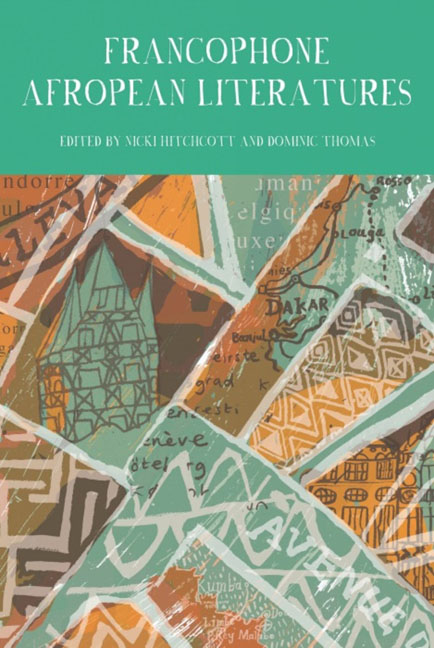Book contents
- Frontmatter
- Contents
- Introduction: Francophone Afropeans
- Essays
- Afropeanism and Francophone Sub-saharan African Writing
- The Transatlantic Poetics of Fatou Diome
- Corps Sans Titre: ‘Fleshiness’ and Afropean Identity in Bessora's 53 Cm
- Already Here: Sami Tchak's Afropean Generation
- Paris Polar: Afropean Noir in the City of Light
- Mapping Afropea: The Translation of Black Paris in the Fiction of Alain Mabanckou
- Relighting Stars and Bazaars of Voices: Exchange and Dialogue in Leonora Mianos Tels Des astres eteints and Alain Mabanckous Black Bazar
- Sex and the Afropean City: Léonora Miano's Blues Pour Élise
- Towards an Afropean Cosmopolitanism: Hospitality, Friendship and the African Immigrant
- Afropean Masculinities as bricolage
- Short Stories
- Notes on Contributors
- Index
Afropeanism and Francophone Sub-saharan African Writing
from Essays
- Frontmatter
- Contents
- Introduction: Francophone Afropeans
- Essays
- Afropeanism and Francophone Sub-saharan African Writing
- The Transatlantic Poetics of Fatou Diome
- Corps Sans Titre: ‘Fleshiness’ and Afropean Identity in Bessora's 53 Cm
- Already Here: Sami Tchak's Afropean Generation
- Paris Polar: Afropean Noir in the City of Light
- Mapping Afropea: The Translation of Black Paris in the Fiction of Alain Mabanckou
- Relighting Stars and Bazaars of Voices: Exchange and Dialogue in Leonora Mianos Tels Des astres eteints and Alain Mabanckous Black Bazar
- Sex and the Afropean City: Léonora Miano's Blues Pour Élise
- Towards an Afropean Cosmopolitanism: Hospitality, Friendship and the African Immigrant
- Afropean Masculinities as bricolage
- Short Stories
- Notes on Contributors
- Index
Summary
How does one have a black face and be European?
Caryl Phillips, Color Me EnglishA collection of topographic maps may prove helpful in evaluating the infrastructure of a particular geographical region. However, attentive observers navigating their way through European cities will be confronted with various commemorative practices celebrating or glorifying French history. Indeed, as Achille Mbembe writes, ‘Love of the fatherland and pride in being French became embodied in public and ritual acts of civic piety: military parades; museums; memorials; commemorations; monuments to the dead; statues; names of boulevards, streets, avenues, bridges, and important places; and, ultimately, the Pantheon’ (Mbembe, 2011: 110). The Franco- Djiboutian novelist Abdourahman A. Waberi is one such observer, sharing with his readers his experience during an extended stay in the German capital, Berlin:
I set out to find those traces of Africa, parsimoniously scattered throughout the federal capital and that remain to this day, for Africans, synonymous with the eponymous congress organised from 15 November 1884 to 26 February 1885 in response to Bismarck's initiative, and with the objective of outlining the rules of the game for dividing up the African continent. (Waberi, 2009: 141)
Such observations could, of course, be reproduced in a multiplicity of national contexts in which the vestiges of the colonial empire are ubiquitous (Aldrich, 2005). Paris is particularly rich in this regard, offering us such examples as the Place Félix Éboué (named after the colonial administrator) in the 12th arrondissement, the rue du Dahomey (the former French colony) in the 11th, or the rue du Commandant-Marchand and the rue de la Mission Marchand (named after the soldier and explorer), both in the 16th. Recently, demands have been made in Germany for the authorities to engage inVergangenheitsbewältigung – in other words to reckon with this practice in order to come to terms with the past as a step towards ‘a “decolonization” of Berlin street names, many of which are shameless references to the country's colonial past’ (Vancauwenberghe, 2012: 6). What remains to be explored is the degree to which these spaces have themselves been reconfigured by African communities and networks, yielding alternative topographies that are increasingly finding a home in the notion of Afropeanism.
- Type
- Chapter
- Information
- Francophone Afropean Literatures , pp. 17 - 31Publisher: Liverpool University PressPrint publication year: 2014



